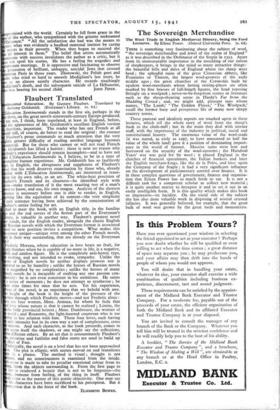Flaubert Translated
[[mental Education. By Gustave Flaubert. Translated by Anthony Goldsmith. (Everyman's Library. 2S. 6d.)
ducation Sentimentale stands in the first six, perhaps in the t three, on the great novels nineteenth-century Europe produced. has not, I think, been translated, at least in England, before, the appearance of Mr. Goldsmith's excellent English version therefore, important. The reader who has any French at all uld still, of course, do better to read the original: the essence Flaubert's prose commands so much attention that the very htly greater difficulty of reading another language becomes aterial. But for those who cannot or will not read French Goldsmith has lifted a barrier : there is now no reason why body's experience should remain incomplete—and to have not d L'Educatton Sentimentale is, I believe, to be in a state of mplete human experience. Mr. Goldsmith has so faultlessly t, in English, the abruptness and suppleness of Flaubert's se that his work deserves examination by those who, already iliar with L'Education Sentimentale, are interested in trans- on for its own sake, as an art. The white-heat precision of bert's French and its dearness—he identified style with on—make translation of it the most exacting test of a man's er to know, and use, his own tongue. Analysis of the shortest ence is necessary before one is able to render, in English, g like the equivalent of its content—the very simplicity each sentence having been achieved by the concentration of ubert's entire feeling for art.
d to meet the book, with an English title, in the familiar and the red covers of the fiction part of the Everyman's rary, is valuable in another way. Flaubert's greatest novel stands, for the English reader, alongside the classic English Russian novels with which the Everyman format is associated d its new position invites a comparison. What makes this -corner unique—unique even among the other French novels, in their way outstanding, that are already on the Everyman
rederic Moreau, whose education in love bears no fruit, for ly finishes when he is capable of no more in life, is a negative, sh and aimless figure. He is the completely anti-heroic type, evoking, and not intended to evoke, sympathy. Unlike the roes of English novels he neither displays prowess nor is dared to us by humility ; unlike the heroes of Russian novels is magnified by no complexities • unlike the heroes of many nch novels he is incapable of exalting any one passion con- ously : he is not even consistent in his ambitions. He exists a series of moments ; he does not attempt to synthesise ; he
nine times for once that he acts. Yet his experience, ect of the novel, is an experience that we behold with awe.
e height of the book is the height of the pressure of the otion through which Frederic moves—and not Frederic alone: re are four women, Mme. Arnoux, for whom he feels that love whose nature is that it cannot be realised ; Louise, the he little provincial heiressMine. Dambreuse, the woman of world ; and Rosanette the heiress; courtesan who is too ul in her relation with him. These four loves, each having only intensity but in its own way a sort of completeness, cross recross. And each character, as the book proceeds, comes to upon itself the shadows, or one might say the reflections, different others. By an art that is consummately Flaubert's minutiae and futilities and false starts are used to build up effect of Fate.
ethnically, the novel is on a level that has not been approached in. The plot is elliptic, with scenes moved on and transitions
in a phrase. The method is visual ; thought is not ysed, and no consciousness is examined from the inside. scene is made to take its peculiar emotional colour from its , from the objects surrounding it. From the first page to last is rendered a beauty that is not to be forgotten—the ty, immune from feeling, of the thing in itself. Flaubert ds alone as the master of this poetic objectivity. One may say his characters have been sacrificed to his perception. But it ception that is the force of the book.
ELIZABETH BOWEN.


























 Previous page
Previous page